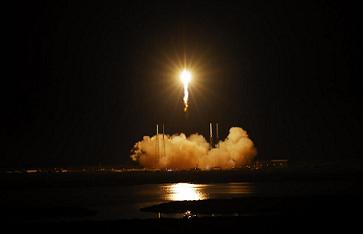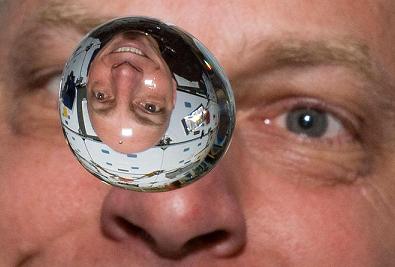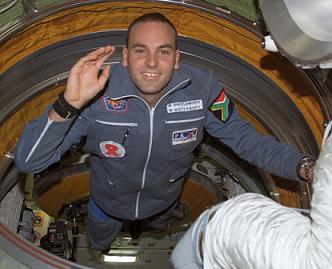The first private firm to launch a craft to the International Space Station (ISS) this week could mean an acceleration in commercial space flight projects and “space tourism”.
But before you start saving for a ticket to the stars(1), try to imagine how it might feel.
Something like the worst long haul flight you've ever experienced...times 10.
Affording the fare is just one criterion. You'd also need to pass a rigorous medical, and with good reason. Space flight is hugely stressful even on astronauts in peak condition, never mind ordinary mortals.

SpaceX Falcon 9 rocket , carrying the Dragon capsule, blasts off towards ISS.
Euphoria, or nausea?
Not only would you need to be fit to begin with, you'd need to stay fit: ISS astronauts spend at least two hours a day on the treadmill and stationary bike to help counter some of the devastating effects microgravity (near-zero gravity) has on the body.
All that floating about looks like an absolute blast, but weightlessness causes a slew of problems for earthlings, from brittle bones to nausea.
In fact nausea is the first thing you're likely to experience on becoming weightless. You may vomit and feel dizzy, headachey and exhausted. These are symptoms of space adapation syndrome: closely related to motion sickness, it’s common in the first few days as your balance control system adapts to weightlessness.
The human body is evolved for life on earth, which means we're adapted to deal with terrestrial gravity. It may seem like a drag, but lack of this force is a total shock to the system and a major barrier to interplanetary space travel. A few minutes of weightlessness is probably harmless, but weeks and months are another matter, and scientists don't know if the effects cause lasting damage.

An astronaut in microgravity views his reflection in a water globule.
We keep our bones and muscles strong simply by resisting gravity’s pull. Without it, these tissues start to weaken – muscle wastes away, as when you're bedridden for months, and bones thin.
Elon Musk, South African-born CEO of SpaceX, the company responsible for this week's space launch, will need to solve the gravity issue problem if he wants to achieve his goal of sending people to Mars in 10-20 years.
Stepping onto the surface of the Red Planet after the 18 months it takes to travel there in near-zero gravity, your weakened legs could snap beneath you.
Calcium leached from thinning bones can also deposit in the soft tissues and cause problems like kidney stones.
Moon faces and flatulence
We're composed mainly of fluid, and on earth gravity keeps this mostly in the lower half of the body. Special mechanisms (like blood circulation), allow some of the fluid to bathe the upper half.
Without gravity, these mechanisms still function, with the result that much of the fluid from the lower body redistributes itself upwards. This gives you a round, puffy face, bulging neck veins, sinus and nasal congestion, vision disturbances (fluid presses on your eyeballs and optic nerves), and loss of sense of taste and smell.
Among various other unglamorous effects, microgravity causes general muscle relaxation, including relaxation of the sphincter muscle, and thus increased flatulence.
Space stress and insomnia
“All the conditions necessary for murder are met if you shut two men in a cabin measuring 18 feet by 20 and leave them together for two months.” – Cosmonaut Valery Ryumin.
The irony of trekking into the vastness of space is that – excluding brief spells on space walks – it’s very claustrophobic and there's precious little privacy. ISS, for example, is roughly the size of a 5-roomed house – but one you're sharing with several other non-family members and can't leave.
We already know the psychological implications of this from earth-bound experiences of confinement to a small space with others, as occurs on submarines and polar research stations. Such conditions, added to the physical stresses and risks of space flight, could cause anxiety, depression, interpersonal conflict and insomnia.
Sleep (and mood) is also disturbed because your circadian rhythm gets confused by variable and unfamiliar light and dark cycles.
Like about 50% of space shuttle astronauts, you may only average two hours or less of sleep, even with sleeping pills.
Tasteless pastes
NASA is adamant that space food has come a long way since gelationous edible cubes at the start of the space programme, and now boasts items like shrimp cocktail and beef stroganoff.
Be that as it may, most if these delectables tend to be in paste format, to prevent them floating off and forming crumbs that clog up the air filters. Drinks are powered and must be mixed with water and sipped through a straw.
There's no refrigeration (too heavy), so fresh fruit and veg must be consumed soon after it leaves earth.
The fact that your sense of taste is muted by the effects of microgravity doesn’t help to make the food any more palatable.
Interesting plumbing
“How do they go to the toilet?” We've been asking that one since manned spaceflight began.
On ISS, you fasten yourself to the toilet seat, equipped with spring-loaded restraining bars “to ensure a good seal” as the European Space Association puts it. A lever operates a powerful fan and a suction hole slides open: the air stream carries the waste away.
Solid waste is stored in bags for later disposal. The front of the toilet has anatomically correct "urine funnel adapters" for your gender; urine travels down a hose to be recycled back into drinking water.
Washing is done using a water jet and wet wipes, rinseless shampoo and edible toothpaste to save water.

Space tourist Mark Shuttleworth on ISS in 2002
Really worth it?
But despite the risk, discomfort and exorbitant expense, most of us would jump at the chance to boldly go. Many believe space exploration to be humanity's greatest endeavour, and more: that the very continuation of our species depends on it.
The Worldwide Fund for Nature (WWF) tells us that at current rates of resource use, even the equivalent of two Earths will not sustain us. Some people (Musk for example) interpret that literally: we need to get off this planet and find more living space, before it's too late.
Notes:
(1) It would currently cost you around $40 million to get as far as ISS, though the price should come down if commercial space travel takes off. Sub-orbital flights, which are brief trips up to around 100-160km, providing a few minutes of weightlessness, views of the curved earth below and stars above, would cost a mere $200 000. Companies like Space Adventures are taking bookings for as early as next year.
References
Information sources: North American Space Association (NASA) and European Space Association (ESA)
Images: NASA.




 Publications
Publications
 Partners
Partners









